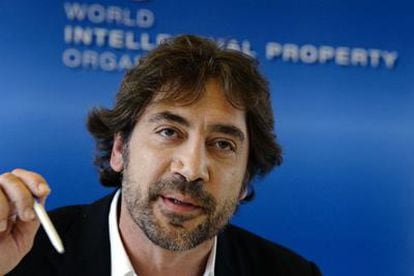Javier Bardem calls for treaty to protect rights of actors
Speaking to UN body, actor also hits out at piracy
Javier Bardem has called for an international treaty guaranteeing the global rights of actors, similar to those enjoyed by other collectives such as musicians. Speaking at the headquarters of the United Nations' World Intellectual Property Organization (WIPO) headquarters in Geneva, Switzerland, on Tuesday, the star of movies such as No Country for Old Men and The Sea Inside also said that he thought that movie tickets should be cheaper so that would-be pirates would get to the cinema once in a while instead of illegally downloading content.
"If you watch a film, the screenwriter is protected, the musician is protected, the composer is protected. But not the performer," he said. The Spanish actor made his speech in the presence of the head of the WIPO, Francis Gurry, and a number of international dignitaries who specialize in intellectual property, and will be working towards a treaty on the issue later in the year.
"More than 90 percent of actors have serious problems to pay rent, bills, and even to eat"
"More than 90 percent of actors have serious problems to pay rent, bills, and even to eat," Bardem said. "Remuneration of actors is crucial. Not for people like me, but for those who have a problem living from what they are doing."
Bardem, who is married to and has a son with fellow Spanish actor Penélope Cruz, went on to hit out at online pirates. "It is like going to a shop, getting those products for free, and running. And the mentality of the people is that [they believe] piracy is fine, because we will harm the actor who has a private jet. But they are wrong. They are harming the people behind these people."
The WIPO has tried several times to promote an international treaty addressing the problem of performer protection at conferences in 1996 and 2000, but failed to come up with a consensual text that would unite the existing models in different countries.
That definitive text, Bardem argued, "must guarantee the actor a small payment once his work has finished during the production stage," independent of the geographical context of the film or TV show in question. And all this is justified, he continued, "because only actors commit their personal image to their work. [...] No fictional audiovisual work would be born as a collective project without its corresponding cast of actors."
Bardem concluded by saying that just 10 percent of actors worldwide make a living from their job, compared to the 20 percent who have to do so combining it with other activities. The remaining 70 percent are actors who appear in front of the camera or on the stage on a sporadic basis.











































